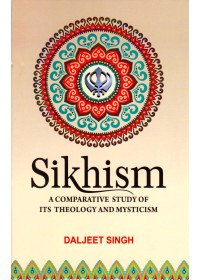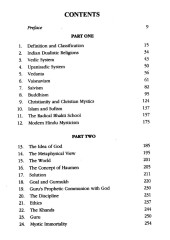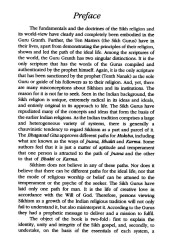Monday to Saturday - 10:00 Am to 9 PM
Now Enjoy Bulk Discounts on Books as Mentioned Below
These Discounts are in addition to the Discounts on Individual Books (Visible as Bulk Discount for Books in Cart)
Extra 10% Off If Books Purchased Exceeds Rs 3000 or 75 USD or 60 GBP or 60 Euro or 100 AUD or 100 CAD
Extra 15% Off If Books Purchased Exceeds Rs 6000 or 150 USD or 120 GBP or 120 Euro or 200 AUD or 200 CAD
Extra 20% Off If Books Purchased Exceeds Rs 15000 or 225 USD or 180 GBP or 180 Euro or 300 AUD or 300 CAD
Extra 25% Off If Books Purchased Exceeds Rs 30000 or 300 USD or 240 GBP or 240 Euro or 400 AUD or 400 CAD
Table Of Contents For 'Sikhism - A Comparative Study of its Theology and Mysticism' Book By Daljeet Singh
|
CONTENTS |
Page No | |
| Preface | 9 | |
|
PART ONE |
||
| 1. | Definition and Classification | 15 |
| 2. | Indian Dualistic Religious | 34 |
| 3. | Vedic System | 43 |
| 4. | Upanisadic System | 50 |
| 5. | Vedanta | 56 |
| 6. | Vaisnavism | 61 |
| 7. | Saivism | 82 |
| 8. | Buddhism | 95 |
| 9. | Christianity and Christian Mystics | 124 |
| 10. | Islam and Sufism | 137 |
| 11. | The Radical Bhakti School | 157 |
| 12. | Modern Hindu Mysticism | 175 |
|
PART TWO |
||
| 13. | The Idea of God | 185 |
| 14. | The Metaphysical View | 195 |
| 15. | The World | 201 |
| 16. | The Concept of Haumen | 205 |
| 17. | Solution | 211 |
| 18. | Goal and Gurmukh | 220 |
| 19. | Guru's Prophetic Communion with God | 230 |
| 20. | The Discipline | 231 |
| 21. | Ethics | 237 |
| 22. | The Khands | 244 |
| 23. | Guru | 250 |
| 24. | Mystic Immortality | 254 |
| 25. | The Lives of Gurus | 256 |
| 26. | A Sikh Mystic | 293 |
| 27. | Conclusion | 300 |
| References | 339 | |
| Select Bibliography | 361 | |
| Index | 367 |
Preface To Book 'Sikhism - A Comparative Study of its Theology and Mysticism' by Daljeet Singh
The fundamentals and the doctrines of the Sikh religion and its world-view have clearly and completely been embodied in the Guru Granth. Further, the Ten Masters (the Sikh Gurus) have in their lives, apart from demonstrating the principles of their religion, shown and led the path of the ideal life. Among the scriptures of the world, the Guru Granth has two singular distinctions. It is the only scripture that has the words of the Gurus compiled and authenticated by the prophet himself. Again, it is the only scripture that has been sanctioned by the prophet (Tenth Nanak) as the sole Guru or guide of his followers as to their religion. And, yet, there are many misconceptions about Sikhism and its institutions. The reason for it is not far to seek. Seen in the Indian background, the Sikh religion is unique, extremely radical in its ideas and ideals, and entirely original in its approach to life. The Sikh Gurus have repudiated many of the concepts and ideas that form the basis of the earlier Indian religions. As the Indian tradition comprises a large and heterogeneous variety of systems, there is generally a chauvinistic tendency to regard Sikhism as a part and parcel of it. The Bhagavad Gita approves different paths for Moksha, including what are known as the ways of Jnana, Bhakti and Karma. Some authors feel that it is just a matter of aptitude and temperament that one person is attracted to the path of jnana and the other to that of Bhakti or Karma.
Sikhism does not believe in any of these paths. Nor does it believe that there can be different paths for the ideal life; nor that, the mode of religious worship or belief can be attuned to the temperament or the psyche of the seeker. The Sikh Gurus have laid only one path for man. It is the life of creative love in accordance with the Will of God. Therefore, persons viewing Sikhism as a growth of the Indian religious tradition will not only fail to understand it, but also misinterpret it. According to the Gurus they had a prophetic message to deliver and a mission to fulfil.
The object of the book is two-fold : first to explain the identity, unity and integrity of the Sikh gospel, and, secondly, to undertake, on the basis of the essentials of each system, a classification of the principal religions of the world and, in that context, to bring out the place of Sikhism among them. There is little doubt that the task needs to be done by a person abler and more learned than I. My only excuse for making this attempt is that it might provoke, scholars to work and produce something with distinction and thoroughness. For, after Macauliffe brought out his monumental exposition of Sikhism, it is only in recent years that further research on the subject has been taken up. But, for obvious reasons, Macauliffe could not emphasis one aspect of Sikhism, viz.., its spiritual role for breaking the shackles of man in all fields of human endeavour and for developing in him a truly religious personality.
What the Sikh Gurus did for the freedom of man is a well known fact of history. But the din of political clamour has generally obliterated the role of the Sikhs for the human cause. Even under the worst political persecution of Mir Mannu, the Muslim tyrant of the north, when there was a price on every Sikh head, their faith in the ultimate victory of their mission is epitomised in their slogan; Mannu is the sickle, we are the grass; the more be cuts us, the faster we grow. H.R. Gupta, while appraising the triumphant struggle of the Sikhs against the Muslim political oppression in the eighteenth century, calls it nothing short of a miracle. Again in the twentieth century, the contribution of the Sikhs in the fight for freedom against the British rule has been, in spite of their meagre population of less than 2% in India, great, indeed, out of all proportion to their numbers. Recently, during the period of the Emergency in 1975-77, more than forty-thousand persons, out of about a lac who were arrested in the country, were the Sikhs, even though the issues concerned only the rights and liberties of man and not those of the Sikh community as such. It was late in 1975 that a non-Sikh friend asked me, "What has happened to the Sikhs who has been created by the Gurus always to fight for righteousness everywhere, and even to lay down their lives for a just or human cause as the Guru had taught them by their martyrdom ?" He felt disappointed that Sikhs with such a tradition had silently accepted the curbs of the Emergency. He was surprised when I informed him that the Sikhs were the only people who had been conducting a Morcha against the Government, involving the arrest of thousands of them.
An amazing lack of understanding of the Sikh world-view is displayed in the surprise which some outsiders express at the inalienable combination of religion, and politics in the Sikh mind. What is the use of a religion, he feels, if it does not enlighten and guide every aspect of man's life and activity? The so called division between religion and politics, camouflaged under the garb of secularism or modernism, has so often irked and annoyed the Sikhs. These differences in points of view have led to many a conflict with the Government of the day.
The Sikhs should not grudge if they have to strive and serve, suffer and sacrifice for the cause of man. That is the role the Gurus have assigned to them; that is the task their tradition and history have trained them for. The success of Sikhism lies in sustaining the ethos the Gurus have so gloriously developed and in treading the course of life laid for them.
Let me express my debt and gratitude to those who have helped me in the completion of the book. Nothing in it is exclusively mine except its faults. But for two persons, S. jagjit Singh, my brother-in-law, and Dr. Prem Nath, Head, Department of Philosophy, Panjab University, I should never have ventured to attempt this work. The latter was by belief a rationalist; but, as a true patriot, he was never happy with some of the negative and complacent trends growing in the Indian culture. During friendly discussions and otherwise in the form of a paper, when I conveyed to him the Sikh world-view, he was impressed by it and wanted me to give it the shape of a book. To my great lament, he did not live to go through the manuscript. Otherwise, its faults would have been eliminated and its oddities removed. S. Jagjit Singh has throughout been closely associated with the writing and the completion of the book. His contribution to it has been so great that, in fairness to him, I requested him to accept its co-authorship. But, out of sheer modesty he declined to do so. The portion dealing with Sikhism was patiently gone through by Dr. Jodh Singh, the Sikh theologian, and Mr. Balwant Singh Anand, a Sikh scholar. The first part of the book, especially the one dealing with Hinduism and Buddhism, was carefully read by my late friend and scholar, Mr. G.R. Vij, formerly Commissioner, Government of Punjab, and Dr. L.M. Joshi, Professor, Department of Religious Studies, Punjabi University, Patiala. In addition, my senior and learned colleague, Mr. J.S. Basur, formerly chairman, Punjab Public Service Commission, has done a patient examination of the manuscript. Dr. Santokh Singh, formerly Director, Post-graduate Institute of Medical Education, Chandigarh, and Major General Gurbaksh Singh, both distinguished students of Sikhism, have also minutely scrutinised the draft. I am very grateful to all these kind friends. Their valuable suggestions have helped me in removing many of the ambiguities and failings of the book. Lastly, I am grateful to my wife, Sardarni Amarjit Kaur, without whose active help this book could never have been accomplished.
Daljeet Singh
About The Author Of Book 'Sikhism - A Comparative Study of its Theology and Mysticism'
Following a bright academic record, the Author had completed successfully for the Civil Services and retired as Secretary and Commissioner Education. Government of Punjab in 1969. After retirement he had devoted himself to the study of Comparative Religion and Sikhism in particular. His works include a number of books and numerous papers on the Religion of Guru Nanak. He had delivered Guru Nanak Memorial Lectures and Guru Tegh Bahadur Commemorative Lectures at the Punjabi University, Patiala, Punjab. He had earned a reputation of being a most authentic and prolific exponent of Sikhism among the scholars of his times. His views on Sikh Theology are sound and unchallenged, being based entirely on the doctrines in the Guru Granth Sahib and the lives of the Gurus.
| Books | |
| Author | Daljeet Singh |
| Pages | 378 |
| Cover | Hardbound |
| Language | English |
Sikhism - A Comparative Study of its Theology and Mysticism - Book By Daljeet Singh
- Brand: Singh Brothers
- Product Code: SPE117
- Availability: In Stock
-
Rs.400.00
Related Products
Essentials of Sikhism - Book By Daljeet Singh
Preface To Book 'Essentials of Sikhism' By Daljeet Singh After a two year study o..
Rs.250.00
The Sikh Philosophy - Book By Surindar Singh Kohli
Table Of Contents For 'The Sikh Philosophy' Book By Surindar Singh Kohli ..
Rs.140.00
The Sikh Ideology - Book By Daljeet Singh
Introduction To Book 'The Sikh Ideology' Book By Daljeet Singh This volume gives a..
Rs.120.00
A Complete Guide To Sikhism - Book By Dr. Jagraj Singh
PREFACE The reason for writing this book is to disseminate information about the Sikhs and Sikhis..
Rs.495.00
History Of Sikh Gurus Retold (1606 - 1708) Vol 2 - Book By Surjit Singh Gandhi
Introduction To 'History Of Sikh Gurus Retold (1606 , 1708) Vol 2' By Surjit Singh Gandhi ..
Rs.1,250.00
Real Sikhism - Book By Surinder Singh Kohli
Introduction To 'Real Sikhism' By Surinder Singh Kohli The misinterpretation of Sikhism due t..
Rs.500.00
Handbook Of Sikh Theology - Book By Shamsher Singh Puri
Preface To 'Handbook Of Sikh Theology' By Shamsher Singh Puri The fundamentals and the do..
Rs.150.00
Tags: books concepts of sikhism, books on gurbani essence, books on gurmat philosophy, books on message of gurbani, books on rehat maryada, books on sikh attributes, books on sikh faith, books on sikh identity, books on sikh ideology, books on sikh philosophy, books on sikh qualities, books on understanding gurbani comparative, study, its, theology, mysticism, daljeet, singh, english















